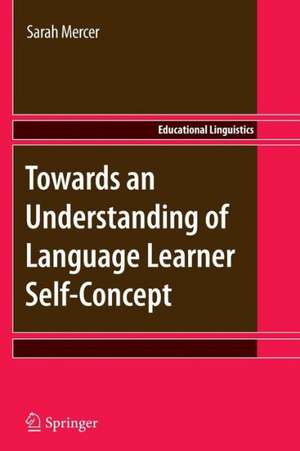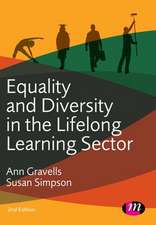Towards an Understanding of Language Learner Self-Concept: Educational Linguistics, cartea 12
Autor Sarah Merceren Limba Engleză Paperback – 25 feb 2013
| Toate formatele și edițiile | Preț | Express |
|---|---|---|
| Paperback (1) | 555.53 lei 38-44 zile | |
| SPRINGER NETHERLANDS – 25 feb 2013 | 555.53 lei 38-44 zile | |
| Hardback (1) | 643.65 lei 43-57 zile | |
| SPRINGER NETHERLANDS – 7 ian 2011 | 643.65 lei 43-57 zile |
Din seria Educational Linguistics
- 18%
 Preț: 959.98 lei
Preț: 959.98 lei - 15%
 Preț: 644.95 lei
Preț: 644.95 lei - 20%
 Preț: 495.50 lei
Preț: 495.50 lei - 18%
 Preț: 952.26 lei
Preț: 952.26 lei - 15%
 Preț: 649.87 lei
Preț: 649.87 lei - 18%
 Preț: 888.18 lei
Preț: 888.18 lei - 15%
 Preț: 644.95 lei
Preț: 644.95 lei - 15%
 Preț: 636.80 lei
Preț: 636.80 lei - 15%
 Preț: 634.49 lei
Preț: 634.49 lei - 18%
 Preț: 940.72 lei
Preț: 940.72 lei - 20%
 Preț: 563.98 lei
Preț: 563.98 lei - 15%
 Preț: 638.57 lei
Preț: 638.57 lei - 20%
 Preț: 568.44 lei
Preț: 568.44 lei - 15%
 Preț: 642.83 lei
Preț: 642.83 lei - 15%
 Preț: 643.48 lei
Preț: 643.48 lei - 18%
 Preț: 899.52 lei
Preț: 899.52 lei - 15%
 Preț: 638.76 lei
Preț: 638.76 lei - 15%
 Preț: 649.06 lei
Preț: 649.06 lei - 15%
 Preț: 643.65 lei
Preț: 643.65 lei -
 Preț: 390.08 lei
Preț: 390.08 lei - 15%
 Preț: 645.28 lei
Preț: 645.28 lei -
 Preț: 393.52 lei
Preț: 393.52 lei - 15%
 Preț: 649.39 lei
Preț: 649.39 lei -
 Preț: 392.75 lei
Preț: 392.75 lei - 18%
 Preț: 897.65 lei
Preț: 897.65 lei -
 Preț: 393.13 lei
Preț: 393.13 lei - 18%
 Preț: 728.28 lei
Preț: 728.28 lei - 15%
 Preț: 638.43 lei
Preț: 638.43 lei - 18%
 Preț: 1113.39 lei
Preț: 1113.39 lei
Preț: 555.53 lei
Preț vechi: 694.42 lei
-20% Nou
Puncte Express: 833
Preț estimativ în valută:
106.31€ • 110.58$ • 87.77£
106.31€ • 110.58$ • 87.77£
Carte tipărită la comandă
Livrare economică 09-15 aprilie
Preluare comenzi: 021 569.72.76
Specificații
ISBN-13: 9789400734838
ISBN-10: 9400734832
Pagini: 236
Ilustrații: XIV, 222 p.
Dimensiuni: 155 x 235 x 12 mm
Greutate: 0.34 kg
Ediția:2011
Editura: SPRINGER NETHERLANDS
Colecția Springer
Seria Educational Linguistics
Locul publicării:Dordrecht, Netherlands
ISBN-10: 9400734832
Pagini: 236
Ilustrații: XIV, 222 p.
Dimensiuni: 155 x 235 x 12 mm
Greutate: 0.34 kg
Ediția:2011
Editura: SPRINGER NETHERLANDS
Colecția Springer
Seria Educational Linguistics
Locul publicării:Dordrecht, Netherlands
Public țintă
ResearchCuprins
List of Appendices
.- List of Figures
.- Glossary
.- Chapter 1 Introduction
.- Chapter 2 What is self-concept?
.- Chapter 3 Understanding self-concept in the FLL context
.- Chapter 4 How do learners form their self-concepts?
.- Chapter 5 Internal frames of reference in FL self-concept formation
.- Chapter 6 External frames of reference in FL self-concept formation
.- Chapter 7 Implications for educators and researchers
.- References
.- Appendices
.
.- List of Figures
.- Glossary
.- Chapter 1 Introduction
.- Chapter 2 What is self-concept?
.- Chapter 3 Understanding self-concept in the FLL context
.- Chapter 4 How do learners form their self-concepts?
.- Chapter 5 Internal frames of reference in FL self-concept formation
.- Chapter 6 External frames of reference in FL self-concept formation
.- Chapter 7 Implications for educators and researchers
.- References
.- Appendices
.
Recenzii
From the reviews:
“Towards an Understanding of Language Learner Self-Concept is an especially insightful and timely contribution. Using a strong, interdisciplinary approach that builds on reflections from current research in both psychology and applied linguistics, Mercer focuses on how learners form their English as a foreign language (EFL) self-concept. … I would have no hesitation in highly recommending this book to language teachers and others who are interested in self-concept or any self-related constructs.” (James Rock, JALT Journal, Vol. 35 (1), May, 2013)
“The book starts with a useful overview of the research domain, which culminates in a convincing argument for the need to depart from the dominant quantitative and hypothesis-testing approaches to researching self-concept and this is exactly what Mercer endeavours to do. … we indeed gain insights that typically remain hidden from the sight of more positivist-oriented researchers, but which resonate much more closely with the everyday experiences of language learners and teachers. The contribution that this book therefore makes to the field is unquestionable.” (Magdalena Kubanyiova, ELT Journal, Vol. 67 (1), January, 2013)
“Towards an Understanding of Language Learner Self-Concept is an especially insightful and timely contribution. Using a strong, interdisciplinary approach that builds on reflections from current research in both psychology and applied linguistics, Mercer focuses on how learners form their English as a foreign language (EFL) self-concept. … I would have no hesitation in highly recommending this book to language teachers and others who are interested in self-concept or any self-related constructs.” (James Rock, JALT Journal, Vol. 35 (1), May, 2013)
“The book starts with a useful overview of the research domain, which culminates in a convincing argument for the need to depart from the dominant quantitative and hypothesis-testing approaches to researching self-concept and this is exactly what Mercer endeavours to do. … we indeed gain insights that typically remain hidden from the sight of more positivist-oriented researchers, but which resonate much more closely with the everyday experiences of language learners and teachers. The contribution that this book therefore makes to the field is unquestionable.” (Magdalena Kubanyiova, ELT Journal, Vol. 67 (1), January, 2013)
Textul de pe ultima copertă
This book contributes to our growing understanding of the nature and development of language learner self-concept. It assesses the relevant literature in the disciplines of psychology and applied linguistics and describes in-depth, qualitative research examining the self-concepts of tertiary-level EFL learners. Although researchers in applied linguistics and SLA have recognized the importance of self-constructs, there remains little empirical work in the context of foreign language learning that focuses exclusively and at length on this central psychological construct.The content of this monograph draws on interdisciplinary sources, with input from psychology and applied linguistics. It will appeal to students and researchers interested in language-learner psychology as well as self-related constructs in general. The text provides insights into how learners view themselves, and how these self-beliefs can develop and affect the progress of an individual’s language learning.
Caracteristici
The only in-depth, detailed work specifically focusing on foreign language learner self-concept Combines insights about self-concept from psychology and applied linguistics/SLA in one comprehensive work Offers theoretical and practical relevance and is therefore of interest to both researchers and language teaching professionals in the field













